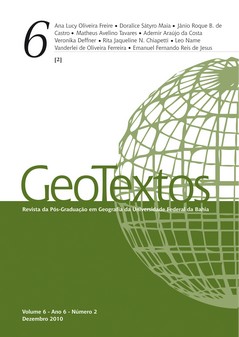GEOGRAPHY OF SOCIAL INEQUALITY
APPROACH FOR A CRITICAL URBAN GEOGRAPHY PRESENTED BY THE SOCIAL PRODUCTION OF THE FAVELA IN SALVADOR (BAHIA)
DOI:
https://doi.org/10.9771/1984-5537geo.v6i2.4833Keywords:
Divided city, Favela, Social inequality, Constructivist space, Pierre Bourdieu, Henri LefebvreAbstract
The empirical analysis of the invisible reproduction of social and spatial inequalities in Brazilian cities demands a specific approach. The following article highlights this approach while taking a critical view on a geography of social inequality. It intends to conceptually contribute to the ongoing research into the causes of perpetuating injustices and examining space as a powerful factor in the reproduction of social inequality. This approach, which is one of hermeneutical geography, aims to understand the structure of the city in its social construction. Taking the idiographic example of Salvador in Brazil background knowledge was acquired following the principles of grounded theory. The approach should be seen as a transferable concept also applicable to other metropolises and societies that are part of the so called “modern periphery” (SOUZA 2000, 2006). The “modern periphery” is characterized by hidden mechanisms perpetuating the logic of social domination and subordination. The specific geographical focus of this approach is to understand the fragmented and divided urban space, coming from different social dispositions. This shall be examined at the example of the social construction and meaning of the favelas.Downloads
Downloads
Published
How to Cite
Issue
Section
License
Autores que publicam nesta revista concordam com os seguintes termos:
Autores mantém os direitos autorais e concedem à revista o direito de primeira publicação, com o artigo simultaneamente licenciado sob a Licença Creative Commons Creative Commons CC BY que permite o compartilhamento do trabalho com reconhecimento da autoria e publicação inicial nesta revista. Esta licença permite que outros distribuam, remixem, adaptem e criem a partir do seu trabalho, mesmo para fins comerciais, desde que lhe atribuam o devido crédito pela criação original. É a licença mais flexível de todas as licenças disponíveis. É recomendada para maximizar a disseminação e uso dos materiais licenciados. Ver o resumo da licença em: https://creativecommons.org/licenses/by/4.0/ Ver o texto legal da licença em: https://creativecommons.org/licenses/by/4.0/ Consulte o site do Creative Commons: https://creativecommons.org/licenses/?lang=pt
Autores têm autorização para assumir contratos adicionais separadamente, para distribuição não-exclusiva da versão do trabalho publicada nesta revista (ex.: publicar em repositório institucional ou como capítulo de livro), com reconhecimento de autoria e publicação inicial nesta revista.
Autores têm permissão e são estimulados a publicar e distribuir seu trabalho online (ex.: em repositórios institucionais ou na sua página pessoal) a qualquer ponto antes ou durante o processo editorial, já que isso pode gerar alterações produtivas, bem como aumentar o impacto e a citação do trabalho publicado (Veja O Efeito do Acesso Livre).






